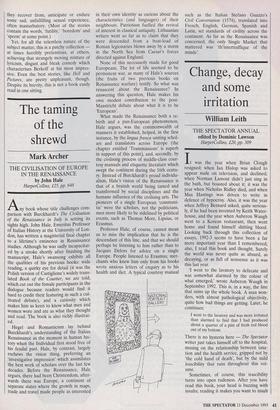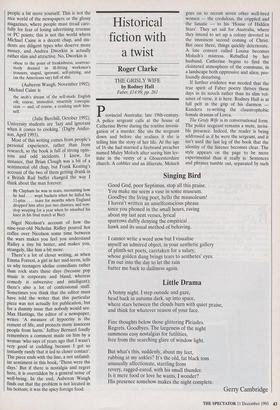Change, decay and some irritation
William Leith
THE SPECTATOR ANNUAL edited by Dominic Lawson HarperCollins, £20, pp. 309 It was the year when Brian Clough resigned; when Ian Hislop was asked to appear nude on television, and declined; when Norman Lamont didn't just sing in the bath, but boasted about it; it was the year when Nicholas Ridley died, and when Max Hastings was driven to write in defence of hypocrisy. Also, it was the year when Jeffrey Bernard asked, quite serious- ly, if he had been invented by Keith Water- house, and the year when Auberon Waugh went to a Korean restaurant, then went home and found himself shitting blood. Looking back through this collection of essays, 1992-3 seems to have been a far more important year than I remembered; also, I read this book and thought, Surely the world was never quite as absurd, as decaying, or as full of nonsense as it was this last year.
`I went to the lavatory to defecate and was somewhat alarmed by the colour of what emerged,' wrote Auberon Waugh in September 1992. This is, in a way, the line that sums up the whole book. A man won- ders, with almost pathological objectivity, quite how bad things are getting. Later, he continues:
I went to the lavatory and was more irritated than alarmed to find that I had produced about a quarter of a pint of fresh red blood out of my bottom.
There is no hysteria here — The Spectator writer just takes himself off to the hospital, musing on the relationship between taxa- tion and the health service, gripped not by `the cold hand of death', but by the mild irascibility that runs throughout this vol- ume.
Sometimes, of course, this irascibility turns into open rudeness. After you have read this book, your head is buzzing with insults; reading it makes you want to insult people a bit more yourself. This is not the nice world of the newspapers or the glossy magazines, where people must tread care- fully for fear of losing advertising revenue or PC points; this is not the world where Michael Caine is a decent chap, and stu- dents are diligent types who deserve more money, and Andrea Dworkin is actually rather slim and attractive. No, Dworkin is
obese to the point of freakishness, unattrac- tively dressed in ill-fitting workmen's trousers, stupid, ignorant, self-pitying, and (as the Americans say) full of shit.
(Auberon Waugh, November 1992). Michael Caine is
the snob's dream of the self-made English oik; coarse, immodest, smarmily concupis- cent — and, of course, a crashing snob him- self.
(Julie Burchill, October 1992). University students are 'lazy and ignorant when it comes to cooking.' (Digby Ander- son, April 1993). Most of this writing comes from people's personal experience, rather than from research, so the book is full of strong opin- ions and odd incidents. I knew, for instance, that Brian Clough was a bit of a sentimental old chap, but Frank Keating's account of the two of them getting drunk in a British Rail buffet changed the way I think about the man forever:
By Clapham he was in tears, recounting how he had . . . wept buckets when he failed his 11-plus . tears for months when England dropped him after just two chances; and non- stop weeping for a year when he smashed his knee in his final match at Bury.
Nigel Nicolson's account of how the nine-year-old Nicholas Ridley poured hot coffee over Nicolson some time between the wars makes you feel you understand Ridley a tiny bit better, and makes you, strangely, like him a bit more.
There's a lot of clever writing, as when Emma Forrest, a girl in her mid-teens, tells us why teenagers idolise comedians rather than rock stars these days (because pop music is corporate and bland, whereas comedy is subversive and intelligent); there's also a lot of confessional stuff. Sometimes you think that the editor must have told the writer that this particular piece was not actually for publication, but for a dummy issue that nobody would see. Max Hastings, the editor of a newspaper, writes: 'A measure of hypocrisy is the cement of life, and protects many innocent people from harm.' Jeffrey Bernard fondly remembers a comment made on him by a woman 'who says of years ago that I wasn't very good at cuddling because I got so instantly randy that it led to closer contact'. The piece ends with the line, a not unfamil- iar sentiment in this book, 'Those were the days.' But if there is nostalgia and regret here, it is overridden by a general sense of well-being. In the end, Auberon Waugh finds out that the problem is not located in his bottom; it was the spicy foreign food.



































































 Previous page
Previous page